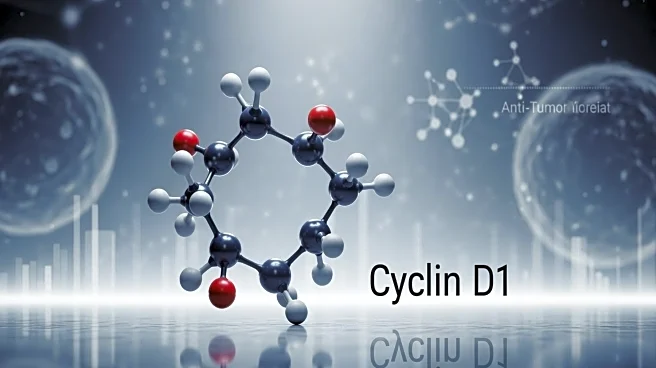What's Happening?
Circle Pharma, a clinical-stage biopharmaceutical company, has unveiled preclinical data from its cyclin D1 development program at the AACR-NCI-EORTC International Conference on Molecular Targets and Cancer
Therapeutics. The data showcases the potential of Circle Pharma's oral macrocyclic inhibitors to disrupt the cyclin D1-Rb interaction, a key driver of cell cycle progression in various cancers. These inhibitors demonstrate potent anti-tumor activity in models of mantle cell lymphoma and ER-positive breast cancer. The company aims to nominate a development candidate by the end of 2025, marking a significant advancement in macrocycle-based cancer therapies.
Why It's Important?
The development of selective inhibitors targeting cyclin D1 represents a promising advancement in cancer treatment, particularly for cancers driven by cyclin D1 overexpression. Circle Pharma's approach could lead to new therapeutic options for patients, potentially improving outcomes in cancers like mantle cell lymphoma and ER-positive breast cancer. The ability to selectively inhibit cyclin D1 while sparing related isoforms may reduce hematologic toxicities associated with current treatments, offering a safer alternative. This innovation could also pave the way for combination therapies, enhancing efficacy and broadening treatment possibilities.
What's Next?
Circle Pharma plans to nominate a development candidate for its cyclin D1 program by the end of 2025. This step will advance the program towards clinical trials, potentially leading to new treatment options for patients with cyclin D1-driven cancers. The company is also exploring the use of these inhibitors in combination with other therapies, which could further enhance their effectiveness. As the program progresses, stakeholders in the pharmaceutical industry and oncology community will be closely monitoring its development and potential impact on cancer treatment paradigms.
Beyond the Headlines
The introduction of macrocyclic inhibitors targeting cyclin D1 could have broader implications for drug development, particularly in addressing historically undruggable targets. Circle Pharma's MXMO™ platform, which enables the creation of cell-permeable and orally bioavailable therapies, may inspire further innovation in the field of targeted cancer therapies. This approach could lead to a shift in how researchers tackle complex biological interactions, potentially unlocking new avenues for treating various diseases beyond cancer.










